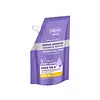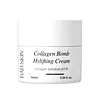What's inside
What's inside
 Key Ingredients
Key Ingredients

 Benefits
Benefits

 Concerns
Concerns

 Ingredients Side-by-side
Ingredients Side-by-side

Water
Skin ConditioningOctocrylene
UV AbsorberGlycerin
HumectantC12-15 Alkyl Benzoate
AntimicrobialMethylene Bis-Benzotriazolyl Tetramethylbutylphenol
UV FilterCaprylic/Capric Triglyceride
MaskingPolysorbate 20
EmulsifyingBis-Ethylhexyloxyphenol Methoxyphenyl Triazine
Skin ConditioningSodium Polyacryloyldimethyl Taurate
Emulsion StabilisingHydrogenated Polydecene
EmollientSqualane
EmollientButylene Glycol
HumectantEuterpe Oleracea Fruit Extract
Bisabolol
MaskingTocopheryl Acetate
AntioxidantHydrolyzed Collagen
EmollientEthylhexylglycerin
Skin ConditioningDecyl Glucoside
CleansingParfum
MaskingXanthan Gum
EmulsifyingCarbomer
Emulsion StabilisingAcrylates/C10-30 Alkyl Acrylate Crosspolymer
Emulsion StabilisingTrideceth-10
CleansingPalmitoyl Tetrapeptide-7
Skin ConditioningPalmitoyl Tripeptide-1
Skin ConditioningDipeptide Diaminobutyroyl Benzylamide Diacetate
Skin ConditioningCeramide NP
Skin ConditioningCeramide AP
Skin ConditioningCeramide EOP
Skin ConditioningChlorphenesin
AntimicrobialRetinol
Skin ConditioningPhytosphingosine
Skin ConditioningSodium Hyaluronate
HumectantCholesterol
EmollientSodium Lauroyl Lactylate
EmulsifyingPhenoxyethanol
PreservativeUbiquinone
AntioxidantHydroxypropyl Cyclodextrin
MaskingWater, Octocrylene, Glycerin, C12-15 Alkyl Benzoate, Methylene Bis-Benzotriazolyl Tetramethylbutylphenol, Caprylic/Capric Triglyceride, Polysorbate 20, Bis-Ethylhexyloxyphenol Methoxyphenyl Triazine, Sodium Polyacryloyldimethyl Taurate, Hydrogenated Polydecene, Squalane, Butylene Glycol, Euterpe Oleracea Fruit Extract, Bisabolol, Tocopheryl Acetate, Hydrolyzed Collagen, Ethylhexylglycerin, Decyl Glucoside, Parfum, Xanthan Gum, Carbomer, Acrylates/C10-30 Alkyl Acrylate Crosspolymer, Trideceth-10, Palmitoyl Tetrapeptide-7, Palmitoyl Tripeptide-1, Dipeptide Diaminobutyroyl Benzylamide Diacetate, Ceramide NP, Ceramide AP, Ceramide EOP, Chlorphenesin, Retinol, Phytosphingosine, Sodium Hyaluronate, Cholesterol, Sodium Lauroyl Lactylate, Phenoxyethanol, Ubiquinone, Hydroxypropyl Cyclodextrin
Hydrolyzed Collagen 61%
EmollientButylene Glycol
HumectantGlycerin
HumectantWater
Skin ConditioningCetearyl Alcohol
EmollientCetyl Ethylhexanoate
EmollientSodium Hyaluronate
HumectantNiacinamide
SmoothingBeeswax
Emulsion StabilisingRehmannia Chinensis Root Extract
Skin ConditioningCetearyl Olivate
Butyrospermum Parkii Butter
Skin ConditioningPropylene Glycol Dicaprylate
EmollientSorbitan Olivate
EmulsifyingHydrogenated Polyisobutene
EmollientAnemarrhena Asphodeloides Root Extract
Skin ConditioningSorbitan Sesquioleate
Emulsifying1,2-Hexanediol
Skin ConditioningCaprylyl Glycol
EmollientAcrylates/C10-30 Alkyl Acrylate Crosspolymer
Emulsion StabilisingArginine
MaskingAllantoin
Skin ConditioningXanthan Gum
EmulsifyingLavandula Angustifolia Flower Extract
CleansingRosmarinus Officinalis Leaf Extract
AntimicrobialOriganum Vulgare Extract
Skin ConditioningThymus Vulgaris Flower/Leaf/Stem Extract
Skin ConditioningCopper Tripeptide-1
Skin ConditioningAdenosine
Skin ConditioningEthylhexylglycerin
Skin ConditioningDipotassium Glycyrrhizate
HumectantAcetyl Hexapeptide-8
HumectantPentylene Glycol
Skin ConditioningAspalathus Linearis Extract
Skin ConditioningGlycyrrhiza Glabra Root Extract
BleachingNicotinoyl Tripeptide-1
AntioxidantPalmitoyl Pentapeptide-4
Skin ConditioningCaffeoyl Sh-Octapeptide-4
AntioxidantCaffeoyl Tripeptide-1
AntioxidantSh-Octapeptide-4
AntioxidantSh-Decapeptide-9
Skin ConditioningSh-Pentapeptide-19
Skin ConditioningCommiphora Myrrha Resin Extract
Skin ConditioningPerilla Frutescens Leaf Extract
MaskingYucca Schidigera Root Extract
Skin ConditioningHydrolyzed Collagen 61%, Butylene Glycol, Glycerin, Water, Cetearyl Alcohol, Cetyl Ethylhexanoate, Sodium Hyaluronate, Niacinamide, Beeswax, Rehmannia Chinensis Root Extract, Cetearyl Olivate, Butyrospermum Parkii Butter, Propylene Glycol Dicaprylate, Sorbitan Olivate, Hydrogenated Polyisobutene, Anemarrhena Asphodeloides Root Extract, Sorbitan Sesquioleate, 1,2-Hexanediol, Caprylyl Glycol, Acrylates/C10-30 Alkyl Acrylate Crosspolymer, Arginine, Allantoin, Xanthan Gum, Lavandula Angustifolia Flower Extract, Rosmarinus Officinalis Leaf Extract, Origanum Vulgare Extract, Thymus Vulgaris Flower/Leaf/Stem Extract, Copper Tripeptide-1, Adenosine, Ethylhexylglycerin, Dipotassium Glycyrrhizate, Acetyl Hexapeptide-8, Pentylene Glycol, Aspalathus Linearis Extract, Glycyrrhiza Glabra Root Extract, Nicotinoyl Tripeptide-1, Palmitoyl Pentapeptide-4, Caffeoyl Sh-Octapeptide-4, Caffeoyl Tripeptide-1, Sh-Octapeptide-4, Sh-Decapeptide-9, Sh-Pentapeptide-19, Commiphora Myrrha Resin Extract, Perilla Frutescens Leaf Extract, Yucca Schidigera Root Extract
Ingredients Explained
These ingredients are found in both products.
Ingredients higher up in an ingredient list are typically present in a larger amount.
Acrylates/C10-30 Alkyl Acrylate Crosspolymer is a synthetic polymer. It is used to thicken and improve the texture of products. Due to its properties, it can prevent water and oil ingredients from separating.
Butylene Glycol (or BG) is used within cosmetic products for a few different reasons:
Overall, Butylene Glycol is a safe and well-rounded ingredient that works well with other ingredients.
Though this ingredient works well with most skin types, some people with sensitive skin may experience a reaction such as allergic rashes, closed comedones, or itchiness.
Learn more about Butylene GlycolEthylhexylglycerin (we can't pronounce this either) is commonly used as a preservative and skin softener. It is derived from glyceryl.
You might see Ethylhexylglycerin often paired with other preservatives such as phenoxyethanol. Ethylhexylglycerin has been found to increase the effectiveness of these other preservatives.
Glycerin is already naturally found in your skin. It helps moisturize and protect your skin.
A study from 2016 found glycerin to be more effective as a humectant than AHAs and hyaluronic acid.
As a humectant, it helps the skin stay hydrated by pulling moisture to your skin. The low molecular weight of glycerin allows it to pull moisture into the deeper layers of your skin.
Hydrated skin improves your skin barrier; Your skin barrier helps protect against irritants and bacteria.
Glycerin has also been found to have antimicrobial and antiviral properties. Due to these properties, glycerin is often used in wound and burn treatments.
In cosmetics, glycerin is usually derived from plants such as soybean or palm. However, it can also be sourced from animals, such as tallow or animal fat.
This ingredient is organic, colorless, odorless, and non-toxic.
Glycerin is the name for this ingredient in American English. British English uses Glycerol/Glycerine.
Learn more about GlycerinHydrolyzed collagen has a misleading name because it is actually a mixture of various proteins/peptides. This ingredient has skin hydrating properties.
Collagen is the most abundant type of structural protein found in your body. In your skin, it is responsible for keeping it firm and youthful.
Hydrolyzed Collagen is created by breaking up proteins into smaller peptide bonds. These peptides act as humectants and emollients.
Humectants are great at holding onto water, keeping skin hydrated. Emollients create a thin barrier on the skin to prevent moisture from escaping.
There is ongoing debate about whether hydrolyzed collagen works because it increases skin hydration. Skin hydration is also linked to elasticity and the appearance of wrinkles.
Collagen or peptide ingredients can be used in the morning or night. They will not increase sun sensitivity, but you should always wear sunscreen during the day.
According to a manufacturer, this ingredient is a great hair conditioner as well.
This ingredient can be extracted from different sources, including:
Vegan collagen is derived from yeast, bacteria, or plant sources. Vegan collagen would go by a different INCI name, such as hydrolyzed soy protein.
The results are varied.
A study from 2021 found hydrolyzed collagen increased elasticity and improved wrinkles in 1,125 participants between age 20 and 70. Another study found increased skin thickness in participants between the ages of 45 to 59.
However, It is difficult to prove that oral collagen will end up working on your skin. Many of the studies using hydrolyzed collagen also add several vitamins and nutrients into the test mixture as well.
Further studies are needed at this time.
Learn more about Hydrolyzed CollagenSodium Hyaluronate is hyaluronic acid's salt form. It is commonly derived from the sodium salt of hyaluronic acid.
Like hyaluronic acid, it is great at holding water and acts as a humectant. This makes it a great skin hydrating ingredient.
Sodium Hyaluronate is naturally occurring in our bodies and is mostly found in eye fluid and joints.
These are some other common types of Hyaluronic Acid:
Learn more about Sodium HyaluronateWater. It's the most common cosmetic ingredient of all. You'll usually see it at the top of ingredient lists, meaning that it makes up the largest part of the product.
So why is it so popular? Water most often acts as a solvent - this means that it helps dissolve other ingredients into the formulation.
You'll also recognize water as that liquid we all need to stay alive. If you see this, drink a glass of water. Stay hydrated!
Learn more about WaterXanthan gum is used as a stabilizer and thickener within cosmetic products. It helps give products a sticky, thick feeling - preventing them from being too runny.
On the technical side of things, xanthan gum is a polysaccharide - a combination consisting of multiple sugar molecules bonded together.
Xanthan gum is a pretty common and great ingredient. It is a natural, non-toxic, non-irritating ingredient that is also commonly used in food products.
Learn more about Xanthan Gum